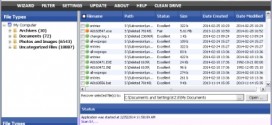|
|
This is a Guest Post made by James Adams and is the first guest post of my blog. I really haven’t made it a group blogging blog, but if you have any articles, please feel free to share it on out blog. Just mail me the article or your post Idea.
Images are a vital part of website design, and fast, attractive images offer the best flair to your web page. Streamlining and optimizing your images for your website is as simple as running them through a handful of high quality tools to make them smaller and faster without compromising image quality. These are a few of the best tools you can use to improve the images on your site.
Free Software
- smush.it – This free tool is a great place to start. It surveys your website and tells you how much data it can save you, and automatically converts images to the .png format, which is the smallest and fastest format for images. The format is also free, which can be important.
- PunyPNG – This free application compresses your .png file even further, removing up to 40% of the data while keeping the same image quality. A great way to speed up your website.
- PNGOUT – A command-line freeware application for creating the smallest PNGs possible. The interface leaves something to be desired, but you can find a lot of tools based on its foundations, such as Image Optim.
- SuperPNG – SuperPNG is a Photoshop plugin that creates better compressed .png images than Photoshop’s built-in converter. Note that while the plugin is free, Photoshop itself is not. If you already have Photoshop, this plugin is a no-brainer; otherwise, you’ll need to find free standalone tools.
- Image Optim – On a Mac, Image Optim is one of the best, easiest, and fastest tools for shrinking your image files. In addition to its own capabilities, it acts as a simplified interface for more complicated tools like OptiPNG, PngCrush, and the aforementioned PNGOUT. It is free and open source.
- OptiPNG – Yet another high quality free tool, OptiPNG is great for doing batch conversions of images to the .png format. Its interface shows you more details about what kinds of operations are being performed on your image, and you can experiment with several different types of manipulation.
- JPG & PNG Stripper – This free tool removes the metadata tags from your .jpg and .png files. Since most web consumers will never look at the metadata of your images, this can help reduce the transfer time for your images. Note that this may affect how the images get indexed by search engines, and that it can make it harder to keep track of information related to the images.
- GIMP – The GNU Image Manipulation Project is the open source competitor to Photoshop. The features aren’t as rich and the interface isn’t as easy, but the free price tag makes it an impressive option for cranking out good graphics and original art work.
- RIOT – The Radical Image Optimization Tool is a standalone application, GIMP plugin, and IrfanView plugin that lets you dynamically modify your image and shows you the visual effects of all of its compression techniques. It is light, small, fast, and easy. It is comparatively new in relation to the other software on this list, and is becoming extremely popular.
Paid Software
- Adobe Photoshop – The reigning kings of image manipulation, Photoshop and its Creative Suite vector based companion Adobe Illustrator, are the most versatile and powerful tools for creating gorgeous images. The “Save for the web” feature ensures that anything you make will be saved in a bandwidt-optimal format. The $699 price can usually be reduced by buying a special package deal.
- PNGOUTWin – If you use PNGOUT on Linux, the Windows edition – $14.95 for personal use or $29.95 for professional use is a cleaner, Windows based version that performs the same size optimization functions as the original.
- SuperGIF – For $29.95, SuperGIF is the fastest application for converting .gif files, especially large ones, into more streamlined and optimized files. If your website has a lot of animated .gif files, this will improve them.
There is no shortage of quality image software on the internet. Most of you tasks can be accomplished with free software, though the best of the best comes from paid softwares
About The Author (James Adams)
James Adams is a technology analyst and writer based in the UK. He writes about and reviews products such as the HP 350 ink cartridge and other office supplies for an online printer ink store.
 Don of web The tech underworld
Don of web The tech underworld

![[Fix] My Laptop Keyboard Suddenly Freeze / Stop Working and Is Not Working Properly [Fix] My Laptop Keyboard Suddenly Freeze / Stop Working and Is Not Working Properly](https://www.donofweb.com/wp-content/uploads/2014/04/BB9320-001-272x125.jpg)




Congo Rajeel to get the first guest post for your blog 🙂
Nice compilation James, let me add one more web based image editing tool http://www.drpic.com/, if possible have a look at this site..
Yup checked it. It’s too an awesome tool 🙂